
The market size for global outsourcing reached $92.5 billion before the pandemic. There is just growth after that. This has made businesses start to take software outsourcing quite seriously. To build a reliable and trustworthy relationship between the third-party company and yours, you need to understand how a software development contract goes. To define a software development services agreement then we can say it specifies how your project will be delivered and what you and your partner will receive at the end of the contract. There’s more than the contract specifies your and your partner’s duties and responsibilities in the event of a disagreement. In this process of application development, software development agreement plays a vital role and hence we decided to give a deeper insight into how software agreement. Through this blog, we would like to bring more clarity to businesses who are willing to use software development services with integration of agreements in the procedure.
1. What is a Software Development Agreement?
The software development agreement is a legal contract between two parties- the client company and the third party software development company including the process of development, delegating data, selling apps, or maintaining the client’s applications. The course of development also includes the integration of products, platforms, and even services. The relationship between both parties is decided based on this software agreement. Your software contract will answer all your questions related to intellectual property rights, support maintenance, source codes, etc.
Right from the inclusion of common sections such as the contract termination conditions upon material breach, dispute resolution, and governing law. The contract also defines some specific aspects such as intellectual property rights, developer written notice, software malfunctions issues, developer’s duties, infringement claims, etc.
Two most important software development agreement clauses that you should know first:
- Intellectual property rights – The software’s intellectual property emphasizes who owns the product. Here you can avoid unwanted claims made by the developer. Also one should take care that developers are not using any third-party materials.
- Confidentiality – The confidentiality clause helps in understanding what kind of information must be kept as a secret. In general, Information related to the software’s source code, the client’s specifications, or the client’s business must be kept confidential by the team working on it. The clause is applicable forever even after the completion of the job.
1.1 Types of Software Development Contracts
Now software development contracts cannot be applicable to every project. Fortunately, there are numerous types of software development agreements available. Choosing the right type of contract will help both sides in minimizing risks and achieve proper results.
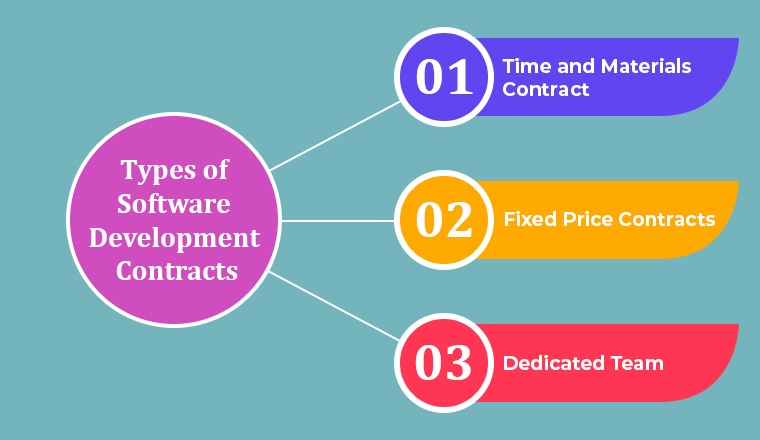
1. Time and Materials Contract
This software development contract in particular is well-suited for projects where the amount of work, as well as time, cannot be determined prior. Project completion time may take longer than expected and you will have to pay for the extra time. However, you will have full control over the development process and will be able to review the work after each sprint. Now let us figure out how beneficial the time and materials contract development model contract is.
- Easy and less complicated way especially when you have just entered the software development realm
- More flexibility and scalability are offered even though the budget remains the same
- With the increase in communication, there are minimum trust issues
- Better chance of achieving your desired result due to constant communication
- Ability to keep track of the project
The only drawback of such a software development contract is businesses have less control over the budget since time and materials aren’t determined prior.
2. Fixed Price Contracts
The fixed budget contract means estimating the price of a certain amount of work. Now, this has no connection with the actual cost of implementation. In addition, a fixed-budget contract offers financial incentives especially for achieving specific project goals.
- Fixed-Price Incentive Fee Contract (FDIF) – A customer pays a contractor regardless of the actual costs. If individual performance criteria are met, the customer pays a premium that both the parties agree upon in the contract.
- Fixed-Price Contract – As the name implies, the cost and project scope of work are determined to right before the work starts and after that cannot be changed.
This model must be incorporated when:
- The requirements are clear,
- The product is appropriately stable,
- The technology is well-understood,
- No ambiguous requirements,
- The project is short.
3. Dedicated Team
A dedicated team model is a great option especially when businesses are aiming to conduct a long-term project. Most software outsourcing companies choose this model due to its flexibility.
When a client looks around for an agile dedicated team it simply means that they are quickly willing to build a custom mobile app. Now why quick, so that it can be well-integrated with the existing system seamlessly.
It’s time to consider what are the key points to include in a software development contract.
2. Points to Include in a Software Development Contract
Let’s find out what should be included in the software development contract:
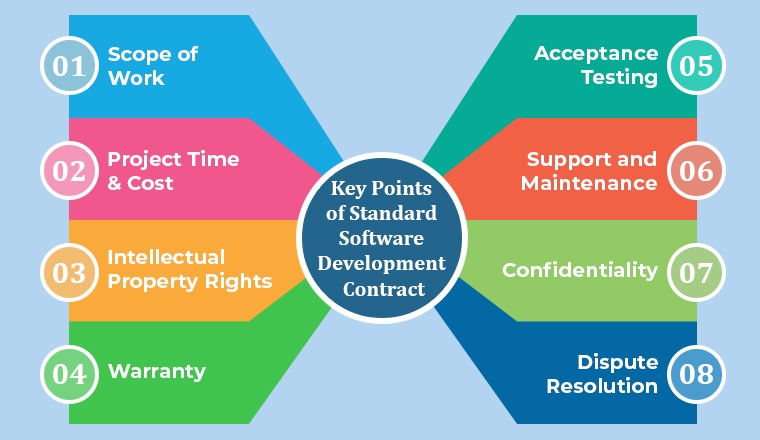
2.1 Scope of Work
The first aspect of the development process is to understand the scope of work. There are many questions interlinked that would answer the scope of the project. Firstly, why do we need to build the project? The project scope might help the software developer understand what is expected from the developer and the user. This implies it’s critical to spell out exactly what will be included in the task and what will be excluded. The next set of questions will answer all your scope-related concerns that must be included in your project scope.
Is there a set number of hours that the project will take?
How would your project distinguish itself from the competition?
What is the future of the developed app?
When will it be marketed?
How long the development sprint is assumed to be taking time?
Similarly, there are many other questions that will make you understand the scope of the projects. These questions are actually answers to your project scope and will help you draft the blueprint of the project easily and efficiently.
2.2 Project Time & Cost
Once your scope of the application is set, the next step is to decide on the pricing structure. So this section lays out your plans for the project’s completion schedule, the project timeline, and cost. To put it another way, it explains the contract model you’ve chosen and how are you going to pay for the developing application. Indicate the hourly rates, development stages, milestones, and deadlines for each.
The contract between the two will also specify the parties’ respective responsibilities for any delays. Include any partial payments that have been agreed upon based on the development’s progress. Annexes to the contract, such as payment schedules and development plans, may be referred to. Simply ensure that both parties have signed any extra documents.
2.3 Intellectual Property Rights
Intellectual property is essential for encouraging innovation. Without intellectual property protection, firms and individuals wouldn’t be unable to gain the full benefits of their inventions. This would be less likely to invest in research and development. It is important to secure your intellectual property rights so that your data doesn’t get breached, the information doesn’t get shared and the financial data doesn’t get leaked. Hence, it is vital to have intellectual property rights for your business.
In case of a delay in payment after the completion of a project, most of the time software development vendors tend to reserve the right to refuse any intellectual property i.e source code. In case, if all invoices have been fully paid by the client, the re-use right will automatically get waved off and thereafter developers will not claim for any such ownership.
2.4 Warranty
A warranty of any product is a vital factor to scale because it guarantees that a product will function properly for a specified period of time. If it doesn’t, your developers shall agree to put reasonable efforts and resolving any problems or difficulties that arise. You and your company should agree on conditions and include them in the software development contract. Make no guarantees that the program will continue to function permanently.
We have made warranty programs as this may be impossible due to the rapidly changing technical environment. Software warranties typically range from some months to a year. You may believe you will always back the product at your own expense if you do not make a definite statement.
2.5 Acceptance Testing
Acceptance Testing is an aspect to understand whether the changes made are accepted after testing or not. From the development service provider’s Point of view. Acceptance testing that is performed for each development phase will signify how changes are accepted to prevent any future repercussions. That is also one of the reasons why businesses opt for Acceptance testing so that the delivered output is up to date and flawless.
The Contract should offer:
- Who does the testing?
- How long does the testing take?
- How are the test results communicated?
2.6 Support and Maintenance
Although there are some support provisions available in the contract some of the benefits are not clear. This may be the most common factor for support services that are beyond the installation and testing phase. For support and maintenance services, they always charge separately or quoted separately if acquired as an Annual Support Agreement. As new technology arises, software evolves at a rapid pace. This implies that if the software you ordered needs to work with other programs, it may need to be updated or upgraded before you can use it again. To avoid this issue and to the software operates efficiently according to the client’s specification, the software development agreement should include the following information:
If you intend to add assistance clauses in your contract, there should be answers to the following information:
- In what all means will you be providing assistance? (email, telephone, or in person).
- What all kinds of issues will the support services will address?
- What upgrades in the software’s code are expected to be required in order to keep up with technological advancements?
- Will the client request extra resources to meet a maintenance contract or existing support services obligations?
2.7 Confidentiality
As mentioned earlier, confidentiality is an extremely important aspect to take into account especially when you are about to sign a software development contract. After all, you will be sharing all your trade secrets. Here do research on legal documentation and confidentiality law, no matter how naive or non-techie you are but knowing your rights and outlining confidential responsibilities is a smart move to make.
Not to mention that when we talk about confidentiality then it shouldn’t be limited to the tech partner. In fact, here each and every team member is responsible enough to comply with the given policy. Furthermore, you can even think of making them sign personal NDAs.
* We firmly recommend you to take some legal advice and have your work checked by a solicitor or lawyer, just like any other legal document.
2.8 Dispute Resolution
Disputes are common between businesses. Even if you have developed an exceptional development agreement, disagreements might arise. The section on dispute resolution explains how the other
party can initiate a dispute. It is critical to outline which laws apply in this case, as well as the applicable nation of law.
It depends on the country that is named in the agreement which will have a significant impact on the laws. In some countries, what is the normal practice unheard of in others?
As a general guideline, choose the country where you already do business or you have a sales office. This is because you will be able to easily receive legal assistance more rapidly. While in other cases, the travel cost will be so high that you won’t be able to spend wisely on the product developed. Taking the effort to spell out the dispute resolution procedure clearly can save you and your money in the long run.
3. Why is a Software Development Agreement Important?
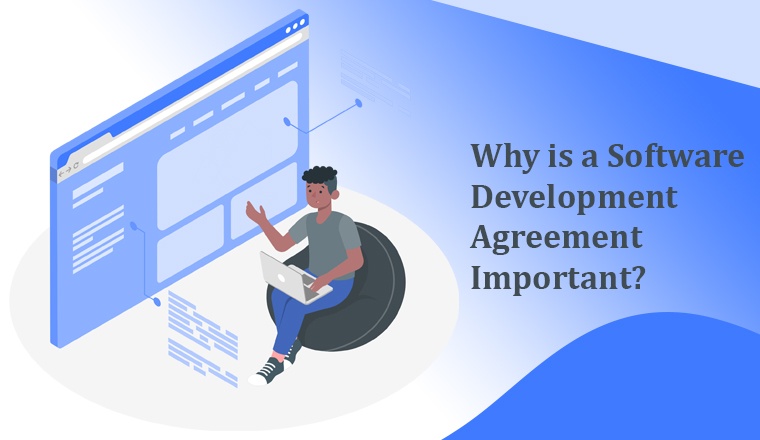
As we all know, there are various phases of application development right from conception to software testing and implementation and support. Hence, it is important to bring clarity to the entire development process and provide steps to determine potential future conflicts between the parties. This agreement often referred to as a Master Services Agreement is crucial for both customers and software companies aiming to develop, sell, transfer, and maintain tailor-made software that sooner or later might end up integrating into their processes, products, or even services.
A well-drafted Agreement makes the software development work journey smooth right from start to finish. It is also considered that preparing an agreement requires you to understand all the software details and techniques/processes used in it. A business running on traditional bars needs software for performing some basic functions and not for important tasks, so the technical knowledge behind the software is not required. Similarly, it is necessary for the one who is in a technology-based business to have a thorough knowledge of the technology used in the software, coding language, and other information for it can go a long way in conceiving a well-drafted agreement that reduces the chances of future disputes.
The relationship between both parties does not come to an end once the final product is delivered by the developer. In fact, we can say that here the job is half-done. There are chances that initial glitches may appear while implementing the software. So constant monitoring and fast solutions to the problems are required. Therefore, a legally sound software agreement is important to predict such techniques and add provisions to actually manage them.
4. Conclusion
With this blog, you must have got a better understanding of what a Software Development Contract is and why it is so important. Do not forget to go through the software development agreement in detail because it is the document that gives legal protection to both parties. There are many custom software development contract templates available online and if you are not satisfied with the contract then you can get it changed with the software development services provider.



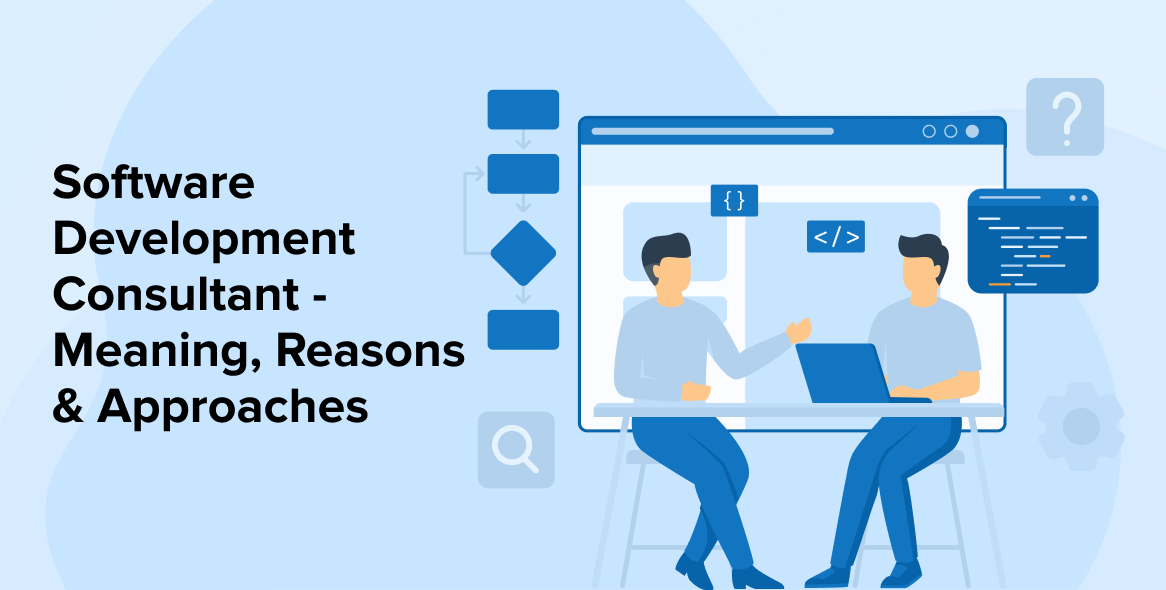
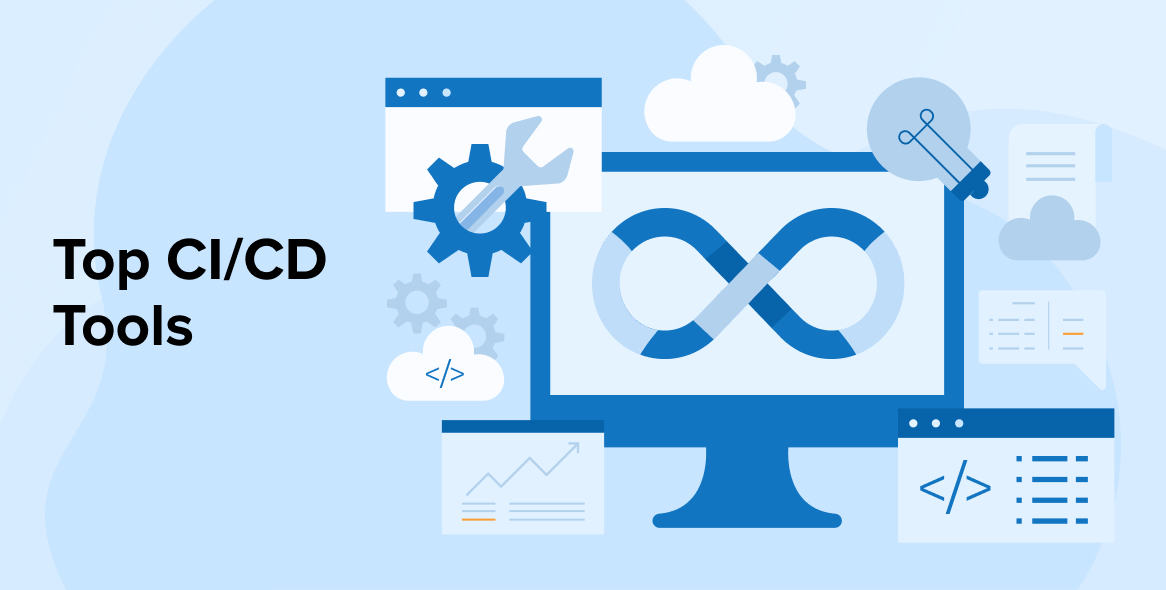

Comments
Leave a message...